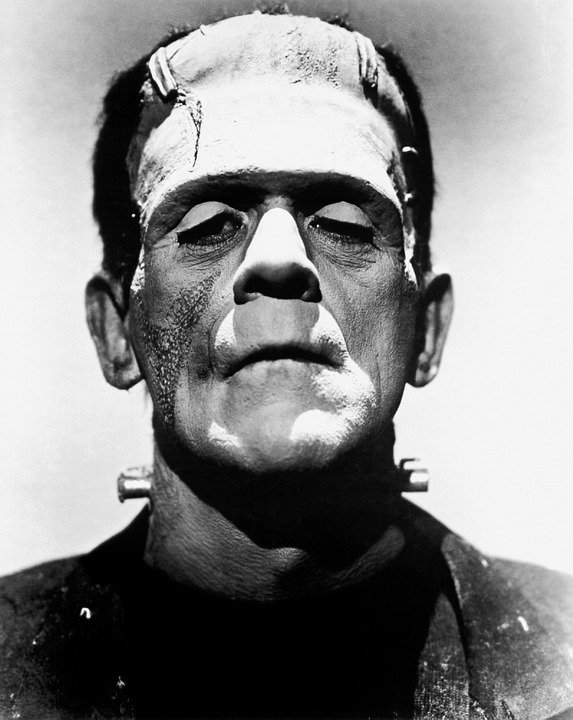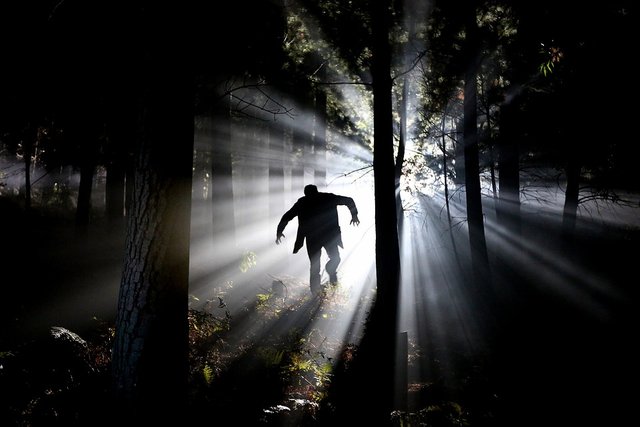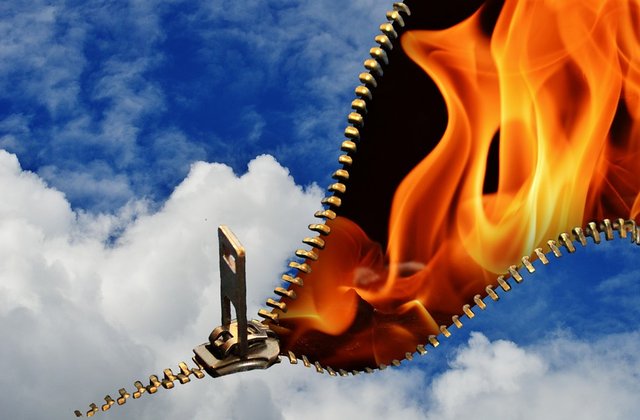Revisiting Frankenstein—A Cautionary Tale


Society-Spawned Humane Monsters and Monstrous Humans: A Reading
Initially, my aversion to supernatural stories kept me from reading Frankenstein— coupled with the cartoonish depiction of the monster as the jolly green giant's evil twin, with bolts protruding from his temples, a tabletop for a head and eternally outstretched arms. I was convinced that the novel would be as dull and lifeless as the countless films modeled after it, and that this was one "classic" I need not rush to know.
After reading Frankenstein, however, I was pleasantly surprised to realize that I had been sadly mistaken. Like all the great texts in literature that I like, this one is an exceedingly complex work -capable of lending itself to a multitude of interpretations, yet not limited to any single one of them.
To begin with, there is no use in ignoring the subtitle of the book, i.e. Frankenstein; or, The Modern Prometheus. The "or" seems to suggest the interchangeability of the two; that Dr. Victor Frankenstein is the modern Prometheus--a Titan in Greek myth who stole fire from Olympus and gave it to humankind in defiance of Zeus, only to be chained to a rock where an eagle tore at his liver until he was finally released by Hercules. In this instance, Frankenstein, the modern Prometheus 'steals' Knowledge from the God(s), and his gift to humankind doubles up as his punishment from it.
Consider the opening epigraph of novel:
Did I request thee, Maker, from my clay To mould me man? Did I solicit thee From darkness to promote me?__
The quote is from Milton's Paradise Lost, X. 743-4 5, from which Mary Shelley extensively quotes. It expresses the existentialist angst which echoes throughout the entire text. As in Milton's great epic poem, it is unclear in Shelley's novel who the hero is; both Victor Frankenstein and the nameless creature (or monster, to some) are heroes in their own right. On the surface level, Victor is the hero of the story because he is the creator of the creature. For better or worse, however, Victor has done what no other man has done, he has taken a giant, superhuman step and delved into the dwelling of the gods -becoming a demigod, himself- and creating another.
In addition to his superior knowledge and achievements, Victor seems an idealized person: clever and compassionate, etc... But, it is as facile to say that Frankenstein is the hero as it is obvious. Instead, it might be the so-called monster who must be perceived as the hero (tragic, of course, since there is little else in this story save for tragedy). Gentle, kind, and sensitive to the subtlest beauties of nature, and human nature alike, the creature contents himself with eating berries and wandering the woods. An autodidact, he teaches himself to speak and read by watching a neighboring family do so from the safety of his home, and later by reading 'the classics.'
Such is the extent of his humanity. Yet, for every loving act he commits, he is met with inhuman cruelty. When he is discovered in the home of the DeLacey family, he is senselessly beaten with a stick, when he saves a girl from drowning, he is shot at by her father, and at all other times he is reviled by all those he comes in contact with. Nonetheless, the revulsion of all others does not compare to that of his creator, the creator who abandoned him (and here's where the existentialist angle comes into play, again). The creature confronts his creator for the first time, and reminding him of his duties:
I ought to be thy Adam; but I am rather the fallen angel, whom thou drivest from joy for no misdeed ... Believe me, Frankenstein: I was benevolent; my soul glowed with love and humanity: but am I not alone, miserably alone? You, my creator, abhor me; what hope can I gather from fellow creatures, who owe me nothing?
Later, in the course of telling his tale, the monster cries out:
Unfeeling, heartless creator! you had endowed me with perceptions and passions, and then cast me abroad an object for the scorn and horror of mankind.
Finally, he ends his soliloquy with this pitiful request:
I am alone, and miserable; man will not associate with me; but one as deformed and horrible as myself would not deny herself to me. My companion must be of the same species, and have the same defects. This being you must create.
Every angst-ridden, doubting teenager can relate to this outburst -- questioning the existence of one's Creator on the one hand, and the wrestling with it one the other (while holding on with tenacity to a life they feel there is little if any reason to hold onto). Or as the monster puts it, "Life, although it may only be an accumulation of anguish, is dear to me, and I will defend it."
Only in this instance, the creator in question is a sub-God. For this reason, I view the creature/monster as the tragic hero of this tale: alienated and alienating at once, abandoned by his creator, and with heightened sensitivity to heighten his misery. Yet as if matters aren't already complicated as they are, they are complicated further by what I consider to be the interrelatedness of the three central characters of Frankenstein.
The similarities shared amongst the three narrators: Robert Walton, the explorer, Victor Frankenstein, the scientist, and the unnamed monster are far too uncanny to be unintentional. Like Frankenstein, Walton wishes to go where no man has been (in his case it is the North Pole, in Frankenstein's it on Godly Grounds). Both characters speak of the importance of a sense of purpose. "Nothing contributes so much to tranquilize the mind as a steady purpose, - a point on which the soul may fix its intellectual eye'" says Walton at the beginning of his voyage. Towards the end of the voyage, Frankenstein says in trying to dissuade the men from turning back "Be steady to your purposes, and firm as a rock".
The similarities between man and monster, can be illustrated to be almost verbatim, their means of expressing their despair virtually identical even where their thoughts are concerned. In one of many fits of melancholic reflection, Frankenstein thinks to himself:
"Alas! Why does man boast of sensibilities superior to those apparent in the brute; it only renders them more necessary beings. If our impulses were confined to hunger, thirst, and desire, we might be nearly free; but now we are moved by every wind that blows, and a chance word or scene that that word may convey to us."
The monster echoes the man's angst moments later, lamenting:
"I cannot describe to you the agony that these reflections inflicted upon me; I tried to dispel them, but sorrow only increased with knowledge. Oh, that I had for ever remained in my native wood, nor known or felt beyond the sensations of hunger, thirst, and heat!"

More importantly, all three narrators are persons obsessed with a quest, to the exclusion of all else, so that when the monster speaks of "a frightful selfishness" which hurried him on during his revenge as retaliation, it might as well be Whalton speaking of his voyage, or Frankenstein of his creation to which, like the monster's revenge, "(he) was the slave, not the master of an impulse, which (he) detested, yet could not disobey."
So, what does all this mean? In this particular example it is a commentary on the misery of reflection and knowledge, and the comparative comfort of the simple life. Also, interestingly, while the story seems to condemn hubris (pride that precedes the fall) along with ambition, Frankenstein does not repent, while the monster does. One would think it safe to assume that the moral of the story, is to caution against overweening aspiration, playing god.
From the reference to Prometheus on the opening page, almost until the last , the text is littered with such warnings. "Learn from me" says Frankenstein to Whalton "...how much happier that man is who believes his native town to be the world, than he who aspires to become greater than his nature will allow." Frankenstein seems to advocate a sense of proportion, he seems to repent -so to speak- against his ungodly creation.
Yet, despite his ruin and his supposed realization, Frankenstein does not seem to have learned the very lesson he proposes to teach. No more is this contradiction more apparent than in his last dying words. After he has passionately spoken to ship men to pursue their voyage, no matter the odds, he reflects one last time on his actions. "During these last days I have been occupied in examining my past conduct; nor do I find it blamable" he says. "Farewell, Whalton! Seek happiness in tranquility, and avoid ambition", he continues, inexplicably.
Can he have forgotten the despair and destruction his 'blameless' conduct has caused to those dearest to him, and himself? Is he in a state of delirium as he says those words? Or has he always been in a state of delirium. In stark contrast, whatever the case against the monster and his crimes, it crumbles in comparison when one learns that he at least regretted his actions and lived a life of self-loathing for their sake. Unlike, his creator, the creature at least offers the reader the satisfaction of his dissatisfaction, remorse.
Not that he will forgive himself, even if we chose to forgive his horrendous actions. Nonetheless, the monster's actions can be understood sooner than those of Frankenstein, if one views them as reactions to culture, or culture-created.
After all, Frankenstein created the creature, abandonment and cruelty created the monster. For abandonment, his creator is responsible, but for cruelty culture, too, is accountable: Romantic Culture.
Just as the contemporary ideas of atheism can be seen to be accountable for the creation of the creature, the collapse of the social contract and/or the corrupting nature of society can be considered responsible for the transformation of creature to monster and his subsequent moral deterioration. What about the early nineteenth century culture then calls for such cultural intolerance towards the society-spawned monster, and how can Frankenstein be seen as "a contribution to the effective dominant culture" as Williams says in his essay: Base and Superstructure?
One concrete example of seeing the monster in terms of a cultural studies analysis would be to say that the monster represents the horrors of a dawning/emergent culture where, for example, formative research in electricity is in practice. (After all, it was electricity that brought the monster to life). But, perhaps this analysis is too concrete -in my eyes, at least- which is why I'd rather view the making of the monster in terms of two key terms: Aesthetics and Literature, or looks and books.
From the moment of his conception, it is sadly the case that the creature is abandoned by his creator solely on account of his appearance, "the horror of that countenance". Subsequently, each and every person who encounters the creature, who initially is blissfully unaware of his own outward appearance, judges him accordingly. It is very telling, and a scathing commentary on the superficiality of society, that the only civilized audience he is granted is with one who does not have the prejudice of vision to discriminate, nor the brutality of youth to intimidate; i.e. old blind man. Never does anyone 'pardon his outward form', as he says, and love him for his good soul and high thoughts. Instead, he is always seen as hideous, abhorred, ghastly, loathsome, distorted, wretched. The list of negative adjectives is long, and they appear almost as often as the incessant appraisals of nature, in sharp contrast--a view which even the monster subscribes to.
Yet, another view to which the monster subscribes to is the importance of books, or high culture/thought. In that sense, the oppressiveness of literature, is the monster which Frankenstein's monster mirrors at a society that cannot stand to see its own reflection. That books define each of the narrators cannot be denied. For, just as the fantastic scientific readings of Frankenstein are fatal, so are the 'classics' to his creature (particularly Paradise Lost, to which he confesses: "excited different and far deeper emotions" than his other readings). Both man and monster end up curiously comparing themselves to Satan:
"All my speculations and hopes are as nothing; like the archangel who aspired to omnipotence, I am chained in an eternal hell"
©Yahia Lababidi

Fantastic essay, Yahia.
I believe Frankenstein to be the greatest novel that I have ever come across. Wuthering Heights comes in second for me. Oddly they have some very similar themes. Frankenstein is written with incredible grace and beauty and contains many rich themes to explore. I always get something new out of it. One cannot read and not develop sympathy for the monster. In all but appearance, he is the greatest of humans. Although his birth was unnatural. I wrote a poem in honour of the monster that I was saving to October to release ... but I have always seen Frankenstein not as a cautionary tale against science playing god but against neglectful parenting and unkind assumptions. Imagine what the mind of Monster could have produced if he had been nurtured rather than spurned.
What an interesting reading, Pryde, neglectful parenting —which attests to the richness of the text. Thanks, for your sympathetic comments; I look forward to your poem :)
Thanks, Yahia:)